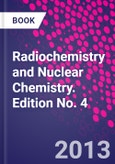Radiochemistry or nuclear chemistry is the study of radiation from an atomic and molecular perspective, including elemental transformation and reaction effects, as well as physical, health and medical properties.
This revised edition of one of the earliest and best-known books on the subject has been updated to bring into teaching the latest developments in research and the current hot topics in the field. To further enhance the functionality of this text, the authors have added numerous teaching aids, examples in MathCAD with variable quantities and options, hotlinks to relevant text sections from the book, and online self-grading tests.
Please Note: This is an On Demand product, delivery may take up to 11 working days after payment has been received.
Table of Contents
Origin of Nuclear Science; Nuclei, Isotopes and Isotope Separation; Nuclear Mass and Stability; Unstable Nuclei and Radioactive Decay; Radionuclides in Nature; Absorption of Nuclear Radiation; Radiation Effects on Matter; Detection and Measurement Techniques; Uses of Radioactive Tracers; Cosmic Radiation and Elementary Particles; Nuclear Structure; Energetics of Nuclear Reactions; Particle Accelerators; Mechanics and Models of Nuclear Reactions; Production of Radionuclides; The Transuranium Elements; Thermonuclear Reactions: the Beginning and the Future; Radiation Biology and Radiation Protection; Principles of Nuclear Power; Nuclear Power Reactors; Nuclear Fuel Cycle; Behavior of Radionuclides in the Environment; Appendices; Solvent Extraction Separations; Answers to Exercises; Isotope Chart; Periodic Table of the Elements; Quantities and Units; Fundamental Constants; Energy Conversion Factors; Element and Nuclide Index; Subject IndexAuthors
Gregory Choppin Department of Chemistry, Florida State University, Tallahassee, FL, USA. Jan-Olov Liljenzin Department of Nuclear Chemistry, Chalmers University of Technology, Goteborg, Sweden. Jan-Olov Liljenzin was professor in Nuclear Chemistry at Chalmers University of Technology, Sweden, between 1989 and 2001, where he was also Dean of the School of Chemical Engineering from 1990 to 1995. Between 1986 and 1989 he was professor in Chemistry at the University of Oslo and Head of the National Committee on Nuclear Science in Norway. Prior to this, his extensive experience saw him hold positions at institutes around the world, including Euratom CCR, Ispra, Italy, and Lawrence Berkeley Laboratory, Berkeley, California, USA. He is an elected member of the Royal Swedish Academy of Engineering Sciences, the Royal Society of Arts and Languages, Göteborg and a permanent member of the Swedish Chemical Society.His research has, among other things, involved the influence of chemistry on core melt accidents, leading on to international research about iodine chemistry, how to mitigate radioactive releases from nuclear accidents, various methods of treatment and separation of spent radioactive fuel, and chemical aspects of final repositories for radioactive waste. After his return to Sweden he was chairman of the research committee at the Swedish Nuclear Power Inspectorate until his retirement. He has 255 published papers and reports in his name or as a coauthor, and is coauthor of several textbooks and monographies. JAN RYDBERG Department of Nuclear Chemistry, Chalmers University of Technology, Goteborg, Sweden. Christian Ekberg Dept. of Chemical and Biological Engineering, Chalmers University of Technology, Göteborg, Sweden. Christian Ekberg is a full professor in Industrial Materials Recycling (since 2007) as well as a full professor in Nuclear Chemistry (since 2012) at Chalmers University of Technology, Göteborg, Sweden. He is also an elected member of the Royal Swedish Academy for Engineering Sciences. The main research focus on the last 25 years has been solution chemistry of the lightest to the heaviest elements in the periodic table (thermodynamics, solvent extraction etc) as well as statistical uncertainty analysis. In later years the focus has started to include recycling processes from various sources as well as the new Gen IV nuclear reactor systems. He has published more than 120 reviewed scientific papers.








